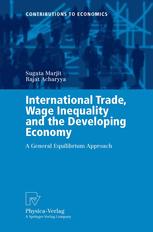

Most ebook files are in PDF format, so you can easily read them using various software such as Foxit Reader or directly on the Google Chrome browser.
Some ebook files are released by publishers in other formats such as .awz, .mobi, .epub, .fb2, etc. You may need to install specific software to read these formats on mobile/PC, such as Calibre.
Please read the tutorial at this link: https://ebookbell.com/faq
We offer FREE conversion to the popular formats you request; however, this may take some time. Therefore, right after payment, please email us, and we will try to provide the service as quickly as possible.
For some exceptional file formats or broken links (if any), please refrain from opening any disputes. Instead, email us first, and we will try to assist within a maximum of 6 hours.
EbookBell Team

4.1
100 reviewsThis book deals with the impact that international trade is likely to have on the skilled-unskilled wage gap in a typical developing economy. This is the first theoretical monograph on this particular issue which has already generated substantial debate and voluminous work for the developed countries. A unique feature of this work is that it tries to explain the possibility of rising inequality across trading nations and looks at the segmented labour markets of the poor economies. It makes convincing arguments that the standard general equilibrium models, the main workhorse of trade theory, can be given a creative facelift to address a number of critical and emerging issues in the area of trade and development.